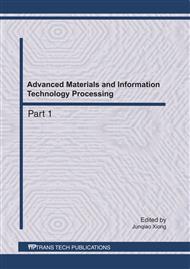[1]
La Porta, R., Lopez-de-Silanes, F., and Shleifer, A., Corporate Ownership around the World[J]. Journal of Finance, 1999. 54: 471-518.
DOI: 10.1111/0022-1082.00115
Google Scholar
[2]
Faccio, Mara, and Larry Lang. The ultimate ownership of Western European Companies[J] Journal of Financial Economics, 2002, 65: 365-395.
DOI: 10.1016/s0304-405x(02)00146-0
Google Scholar
[3]
Johson S, La Porta R, Lopez-de-Silanes F, and Shleifer A. Tunneling [J]. American Economic Review, 2000, 90(2): 22-27.
DOI: 10.1257/aer.90.2.22
Google Scholar
[4]
Ben-Amar, W. and P. André. Separation of Ownership and Control and Acquiring Firm Performance: The Case of Family Ownership in Canada [J], Journal of Business Finance and Accounting, 2006, 33 (3) & (4): 517-543.
DOI: 10.1111/j.1468-5957.2006.00613.x
Google Scholar
[5]
Holmen, M. and J.D. Knopf, Minority Shareholder Protections and the Private Benefits of Control for Swedish Firms[J], Journal of Financial and Quantitative Analysis, 2004, 39: 167-191.
DOI: 10.1017/s0022109000003938
Google Scholar
[6]
Bae, K.H., J.K. Kang. and J.M. Kim, Tunnelling or Value Addition? Evidence from Mergers by Korean Business Groups [J], Journal of Finance, 2002, 57: 2695-2740.
DOI: 10.1111/1540-6261.00510
Google Scholar
[7]
Huang Xingluan and Shen Weitao, Propping or Pulling out Empirical Analysis from Related Acquisitions of Chinese listed Companies [J], Economics Mnagement Journal, 2006, 12: 57-64. ( In Chinese).
Google Scholar
[8]
Li Zengquan, Yu Qian and Wang Xiaokun, Tunneling, Propping and M&A: Evidence from Chinese Listed Companies [J], Economics Research Journal, 2005, 1: 95-105. ( In Chinese).
Google Scholar
[9]
Bhaumik, Sumon K. and Selarka, Ekta , Impact of M&A on Firm Performance in India: Implications for Concentration of Ownership and Insider Entrenchment[R], William Davidson Institute Working Paper No. 907. Available at SSRN: http: /ssrn. com/abstract=970001, (2008).
DOI: 10.2139/ssrn.970001
Google Scholar
[10]
Bigelli, M. and S. Mengoli, Sub-Optimal Acquisition Decision under a Majority Shareholder System[J], Journal of Management and Governance, 2004, 8: 373-405.
DOI: 10.1007/s10997-004-4896-2
Google Scholar
[11]
Jung Wook Shim and Hiroyuki Okamuro, Mergers by Family and Non-family Firms in Japan, 1955-1973: Does Ownership Matter?[R] Available at: http: /hermes-ir. lib. hit-u. ac. jp/rs/handle/10086/16225, (2008).
Google Scholar
[12]
Zhu Dongqin and Chen Wenhao, Effects of Control Right and the Deviation between Control Right and Cash Flow Right on Acquisitions: Evidence from Private Listed Companies in China [J], Journal of Economics and Finance, 2010, 2: 121-131. ( In Chinese).
DOI: 10.1007/978-3-642-37270-4_64
Google Scholar
[13]
Shleifer, Andrei, and Robert W. Vishny, Large Shareholders and Corporate Control[J], Journal of Political Economy , 1986. 94: 461-88.
DOI: 10.1086/261385
Google Scholar
[14]
La Porta, R., Lopez-de-Silanes, F., Shleifer, A., and R. Vishny,. Investor Protection and Corporate Valuation [J]. Journal of Finance, 2002. 57(3): 1197-1170.
DOI: 10.1111/1540-6261.00457
Google Scholar
[15]
Wu Hongjun and Wu Shinong, Theoretical Analysis and Empirical Test to Check-and-balance Ownership Structure, Tunneling and Corporate value [J], Economics Mnagement Journal, 2 009, 3: 44-52. ( In Chinese).
Google Scholar
[16]
Gorton, Gary B., Kahl, Matthias and Rosen, Richard J, \Eat or Be Eaten: A Theory of Mergers and Merger Waves [J], Journal of Finance, 2009, 64: 1291-1340.
DOI: 10.3386/w11364
Google Scholar
[17]
Ma Xiaojun and Shen Qiongye, Private Benefit, Agency and M&A: An Analysis on Vote Right as well as Control Right Doscount [J], Nankai Economic Studies , 2004, 3: 87-92. ( In Chinese).
Google Scholar
[18]
Muthoo, Abhinay (1999), Bargaining Theory with Applications[M], Cambridge, United Kingdom: Cambridge University Press.
Google Scholar
[19]
Shi Xiancheng, A Positive Analysis of Ownership Structure and Merger Conduction Preference [J], The Study of Finance and Economics, 2004, 6: 134-144. ( In Chinese).
Google Scholar
[20]
Chen Jian and Xi Youmin, The Relationship of Group Affiliation, Concentration of Corporate Control and M&A with Related Party in Listed Companies [J], System Engineering, 2008, 1: 8-14(In Chinese).
Google Scholar
[21]
Chen Jian , Xi Youmin and Jia Jun, Study on the Relationship of Corporate Control Balance and M&A with Related Party of Chinese Listed Companies [J], Management Review, 2009, 5: 3-12. ( In Chinese).
Google Scholar
[22]
Jing Chi, Qian Sun, Martin R. Young Performance and Characteristics of Acquiring Firms in the Chinese Stock Markets[R]. CFRN working paper, Available at CFRN: http: /www. cfrn. com. cn/getPaper. do?id=1796, (2009).
Google Scholar
[23]
Song, Saw-Imm, Ali, Ruhani and Pillay, Subramaniam, Corporate Takeovers in in Malaysia: The Determinants of Post-Acquistion Values of Acquiring Firms[R], Available at SSRN: http: /ssrn. com/abstract=1031609, (2007).
DOI: 10.2139/ssrn.1031609
Google Scholar


